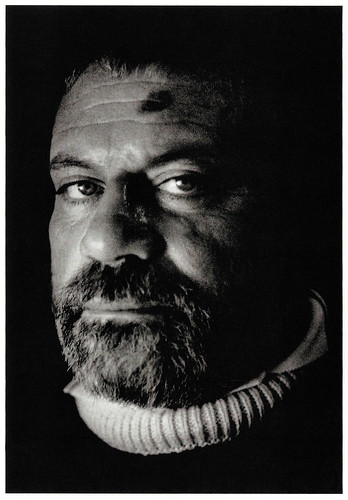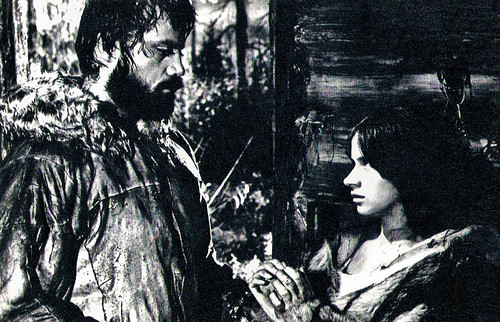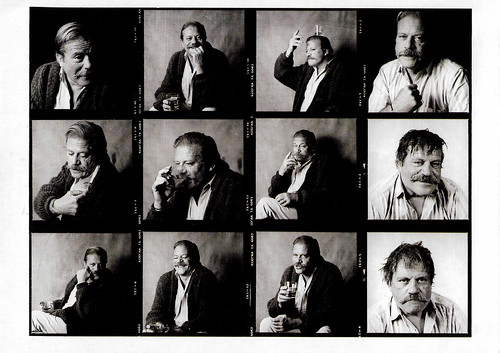Brooding macho Oliver Reed (1938-1999) was one of England's darker leading men and villainous character actors. He juggled over 60 film roles in 40 years and a full-blooded social life of women, booze, and bar fights. After a start in Hammer films, Reed worked often with acclaimed British directors Ken Russell, Richard Lester, and Michael Winner. His final role was as the old, gruff gladiator trainer in Ridley Scott's Gladiator (2000).

Dutch postcard by Art Unlimited, Amsterdam, no. B 2201. Photo: Robin Barton, 1988.
Robert Oliver Reed was born in 1938, in Wimbledon, England. His parents were Peter Reed, a sports journalist, and Marcia Reed née Napier-Andrews. He had two brothers. David Reed became his business manager and his half-brother Simon Reed became his press agent. He was a nephew of film director Sir Carol Reed. And he was a grandson of actor-manager Herbert Beerbohm Tree, who founded the Royal Academy of Dramatic Art (RADA) in 1904.
Party animal Reed did not complete high school. He ended up taking on a variety of blue-collar jobs. His first job at the age of 17 was as a bouncer at a Soho nightclub. In 1960, he suddenly burst into films, showing up in the background of the Hammer films The Two Faces of Dr. Jekyll (Terence Fisher, 1960), and Sword of Sherwood Forest (Terence Fisher, 1960), and as a gay ballet dancer in the criminal comedy The League of Gentlemen (Basil Dearden, 1960).
His first starring role came with Hammer, as the title character in Curse of the Werewolf (Terence Fisher, 1961). Robert Armstrong at AllMovie: "Years later, he would serve as the narrator on a full Hammer retrospective, putting his sonorous speaking voice to good use and paying homage to his roots. Such early work paved the way for a steady flow of bad-guy roles in horrors, costume dramas, and suspense thrillers. Reed's intense, glowering features could also be manipulated for believable ethnic characterizations."
Films such as the Science-Fiction horror film The Damned (Joseph Losey, 1962) and Pirates of Blood River (John Gilling, 1962) followed. His first of six collaborations with Michael Winner came with The System/The Girl Getters (1964). The film was seen by Ken Russell who then cast Reed in the title role of The Debussy Film (1965), a TV biopic of Claude Debussy. It was the first time he broke away from villainous roles. According to Wikipedia, Reed later said: "Hammer films had given me my start and Michael Winner my bread then Ken Russell came on the screen and gave me my art."
Reed co-starred with Rita Tushingham in the Canadian-British co-production, The Trap (Sidney Hayers, 1966). His career stepped up another level when he starred in his second film with Winner, the popular comedy film The Jokers (Michael Winner, 1966), alongside Michael Crawford. His third Winner film was I'll Never Forget What's'isname (Michael Winner, 1967), with Orson Welles. Reed was reunited with Ken Russell for another TV film, Dante's Inferno (1967), playing Dante Gabriel Rossetti.
In 1968, he won his first leading role in a universally well-received film, the Oscar-winner Oliver! (Carol Reed, 1968), in which he played murderous thief Bill Sikes. Despite complaints of nepotism, Reed insisted he had to persuade his uncle to cast him, even though his credentials closely matched the needs of the part.
Another watershed moment came in 1969 when Ken Russell cast him as one of the leads in his adaptation of D.H. Lawrence's Women in Love (1969). Robert Armstrong at AllMovie: "While the film was a well-received treatise on sexuality and marriage, it achieved some notoriety for featuring the first-ever full-frontal male nudity in an English-language commercial film. Reed and Alan Bates engage in a memorable nude wrestling match that audaciously fleshes out the film's themes. Reportedly, Russell had planned to scrap the scene, worried about censor backlash, until Reed wrestled him into including it, literally pinning him down, in Russell's kitchen. Still, Reed told the Los Angeles Times he had to drink a bottle of vodka before he could relax enough to film the scene."

East-German postcard by Progress Film-Verleih, no. 2921, 1967. Rita Tushingham and Oliver Reed in The Trap (Sidney Hayers, 1966).

Romanian postcard by Casa Filmului Acin, no. 51. Oliver Reed and Rita Tushingham in The Trap (Sidney Hayers, 1966).
Oliver Reed and Ken Russell would work together five more times, including The Devils (1971) and Tommy (1975), in which Reed played Frank Hobbs.
Reed was also known for portraying musketeer Athos in three of Richard Lester's film versions of Alexandre Dumas' famous tale. Reed appeared in The Three Musketeers (1973) and its sequel, The Four Musketeers (1974), which originally had been planned as one long film. He revived the role for The Return of the Musketeers (1989).
During the filming of the windmill duel scene in the first film, Reed was nearly killed when he was stabbed in the throat. Add in 36 stitches to repair cuts on his face after a bar fight in 1963, and the actor had more than his share of scrapes.
Reed peaked in many ways in the mid-1970s and had to settle on genre work for much of his later career. Films such as Dr. Heckyl and Mr. Hype (Charles B. Griffith, 1980), Venom (Piers Haggard, 1982), Gor (John Norman, 1987), and Dragonard (Gérard Kikoïne, 1987) became his regular source of paychecks for many years.
More interesting films were David Cronenberg's The Brood (1979), Nicolas Roeg's Castaway (1987), or Terry Gilliam's The Adventures of Baron Munchausen (1989).
Reed's most familiar role for modern audiences was also his last. The actor appeared in Oscar-winner Gladiator (Ridley Scott, 2000) as Proximo, the amoral merchant who trains the enslaved fighters to kill and be killed. When he died midway through production, Reed unwittingly became part of a groundbreaking three-million-dollar endeavor by director Ridley Scott to digitally re-create his likeness in order to film Proximo's death scene. A three-dimensional image of Reed's face was scanned into computers so it could smile and talk, then digitally grafted onto a body double.
In 1999, Oliver Reed died in Valetta, Malta, where Gladiator was being filmed. Robert Armstrong at AllMovie: "the result of a heart attack brought on by one last night of hard-drinking, which included three bottles of downed rum and arm wrestling victories over five sailors." He was survived by his second wife, Josephine Burge. He was the father of Mark Thurloe Reed (1961) with his first wife Kate Byrne and of Sarah Reed (1970) from his 12-year relationship to dancer Jacqueline Daryl.

British postcard in the 'Greatest' Series - Drunks by Boomerang. Photo: John Curtis / Rex.

British postcard by Olympus / London Cardguide Ltd / Cinema House, London. Photos: Koo Stark. Caption: From the Olympus Cameras sponsored exhibition 'Stark Image' at The Gallery Bar, Grosvenor House Hotel, Park Lane June 3rd-20th.
Sources: Robert Armstrong (AllMovie), Wikipedia, and IMDb.

Dutch postcard by Art Unlimited, Amsterdam, no. B 2201. Photo: Robin Barton, 1988.
A steady flow of bad-guy roles in horrors, costume dramas, and suspense thrillers
Robert Oliver Reed was born in 1938, in Wimbledon, England. His parents were Peter Reed, a sports journalist, and Marcia Reed née Napier-Andrews. He had two brothers. David Reed became his business manager and his half-brother Simon Reed became his press agent. He was a nephew of film director Sir Carol Reed. And he was a grandson of actor-manager Herbert Beerbohm Tree, who founded the Royal Academy of Dramatic Art (RADA) in 1904.
Party animal Reed did not complete high school. He ended up taking on a variety of blue-collar jobs. His first job at the age of 17 was as a bouncer at a Soho nightclub. In 1960, he suddenly burst into films, showing up in the background of the Hammer films The Two Faces of Dr. Jekyll (Terence Fisher, 1960), and Sword of Sherwood Forest (Terence Fisher, 1960), and as a gay ballet dancer in the criminal comedy The League of Gentlemen (Basil Dearden, 1960).
His first starring role came with Hammer, as the title character in Curse of the Werewolf (Terence Fisher, 1961). Robert Armstrong at AllMovie: "Years later, he would serve as the narrator on a full Hammer retrospective, putting his sonorous speaking voice to good use and paying homage to his roots. Such early work paved the way for a steady flow of bad-guy roles in horrors, costume dramas, and suspense thrillers. Reed's intense, glowering features could also be manipulated for believable ethnic characterizations."
Films such as the Science-Fiction horror film The Damned (Joseph Losey, 1962) and Pirates of Blood River (John Gilling, 1962) followed. His first of six collaborations with Michael Winner came with The System/The Girl Getters (1964). The film was seen by Ken Russell who then cast Reed in the title role of The Debussy Film (1965), a TV biopic of Claude Debussy. It was the first time he broke away from villainous roles. According to Wikipedia, Reed later said: "Hammer films had given me my start and Michael Winner my bread then Ken Russell came on the screen and gave me my art."
Reed co-starred with Rita Tushingham in the Canadian-British co-production, The Trap (Sidney Hayers, 1966). His career stepped up another level when he starred in his second film with Winner, the popular comedy film The Jokers (Michael Winner, 1966), alongside Michael Crawford. His third Winner film was I'll Never Forget What's'isname (Michael Winner, 1967), with Orson Welles. Reed was reunited with Ken Russell for another TV film, Dante's Inferno (1967), playing Dante Gabriel Rossetti.
In 1968, he won his first leading role in a universally well-received film, the Oscar-winner Oliver! (Carol Reed, 1968), in which he played murderous thief Bill Sikes. Despite complaints of nepotism, Reed insisted he had to persuade his uncle to cast him, even though his credentials closely matched the needs of the part.
Another watershed moment came in 1969 when Ken Russell cast him as one of the leads in his adaptation of D.H. Lawrence's Women in Love (1969). Robert Armstrong at AllMovie: "While the film was a well-received treatise on sexuality and marriage, it achieved some notoriety for featuring the first-ever full-frontal male nudity in an English-language commercial film. Reed and Alan Bates engage in a memorable nude wrestling match that audaciously fleshes out the film's themes. Reportedly, Russell had planned to scrap the scene, worried about censor backlash, until Reed wrestled him into including it, literally pinning him down, in Russell's kitchen. Still, Reed told the Los Angeles Times he had to drink a bottle of vodka before he could relax enough to film the scene."

East-German postcard by Progress Film-Verleih, no. 2921, 1967. Rita Tushingham and Oliver Reed in The Trap (Sidney Hayers, 1966).

Romanian postcard by Casa Filmului Acin, no. 51. Oliver Reed and Rita Tushingham in The Trap (Sidney Hayers, 1966).
A Night with three bottles of downed rum and arm wrestling victories over five sailors
Oliver Reed and Ken Russell would work together five more times, including The Devils (1971) and Tommy (1975), in which Reed played Frank Hobbs.
Reed was also known for portraying musketeer Athos in three of Richard Lester's film versions of Alexandre Dumas' famous tale. Reed appeared in The Three Musketeers (1973) and its sequel, The Four Musketeers (1974), which originally had been planned as one long film. He revived the role for The Return of the Musketeers (1989).
During the filming of the windmill duel scene in the first film, Reed was nearly killed when he was stabbed in the throat. Add in 36 stitches to repair cuts on his face after a bar fight in 1963, and the actor had more than his share of scrapes.
Reed peaked in many ways in the mid-1970s and had to settle on genre work for much of his later career. Films such as Dr. Heckyl and Mr. Hype (Charles B. Griffith, 1980), Venom (Piers Haggard, 1982), Gor (John Norman, 1987), and Dragonard (Gérard Kikoïne, 1987) became his regular source of paychecks for many years.
More interesting films were David Cronenberg's The Brood (1979), Nicolas Roeg's Castaway (1987), or Terry Gilliam's The Adventures of Baron Munchausen (1989).
Reed's most familiar role for modern audiences was also his last. The actor appeared in Oscar-winner Gladiator (Ridley Scott, 2000) as Proximo, the amoral merchant who trains the enslaved fighters to kill and be killed. When he died midway through production, Reed unwittingly became part of a groundbreaking three-million-dollar endeavor by director Ridley Scott to digitally re-create his likeness in order to film Proximo's death scene. A three-dimensional image of Reed's face was scanned into computers so it could smile and talk, then digitally grafted onto a body double.
In 1999, Oliver Reed died in Valetta, Malta, where Gladiator was being filmed. Robert Armstrong at AllMovie: "the result of a heart attack brought on by one last night of hard-drinking, which included three bottles of downed rum and arm wrestling victories over five sailors." He was survived by his second wife, Josephine Burge. He was the father of Mark Thurloe Reed (1961) with his first wife Kate Byrne and of Sarah Reed (1970) from his 12-year relationship to dancer Jacqueline Daryl.

British postcard in the 'Greatest' Series - Drunks by Boomerang. Photo: John Curtis / Rex.

British postcard by Olympus / London Cardguide Ltd / Cinema House, London. Photos: Koo Stark. Caption: From the Olympus Cameras sponsored exhibition 'Stark Image' at The Gallery Bar, Grosvenor House Hotel, Park Lane June 3rd-20th.
Sources: Robert Armstrong (AllMovie), Wikipedia, and IMDb.
No comments:
Post a Comment